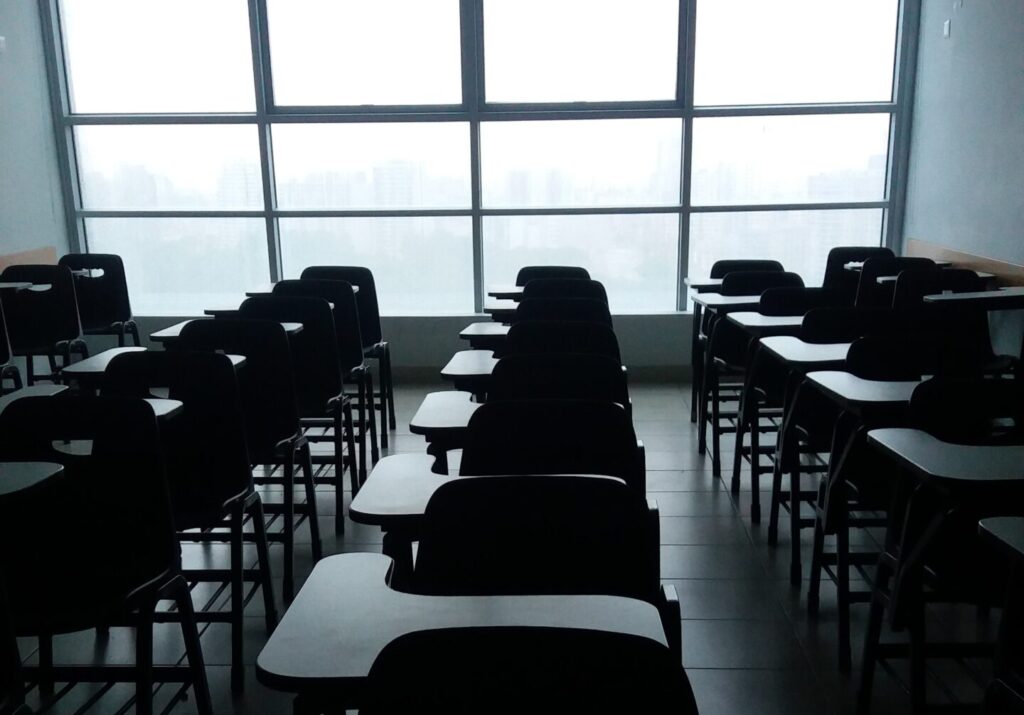
Since taking office for his second term, President Donald Trump’s administration has overhauled immigration policies through a flurry of executive orders, mass deportations and lawsuits. Amid the crackdown, two Nashville teachers say they have seen a rise in absences among their immigrant students and are working to support them.
Ruby Aguilar teaches at a Nashville high school with a large immigrant population. WPLN News is not identifying the school to protect the privacy of the students. She said attendance has dropped.
“Especially in classes where I have students that do come from undocumented backgrounds or are undocumented themselves,” she said. “Just news reports about ICE raids … potentially coming to schools, and ‘Is school safe or not?’ — I think that also prompted students to just not come.”
‘Half of the class is missing’
Schools were typically off limits for Immigration and Customs Enforcement. But Trump got rid of the policy preventing agents from arresting people without permanent legal status in places like schools, hospitals and churches.
Increased immigration enforcement can lead to chronic absenteeism among students, according to the Kaiser Family Foundation.
On Saturday night, ICE took numerous drivers in South Nashville into custody. These included Uber drivers and mothers with young children, who were allegedly left in cars by themselves, according to eyewitness reports.
Incidents like these, Aguilar said, cause an increase in absenteeism. She typically has about 23 students per class. But on days following any news impacting immigrants, only 10 to 12 students might show up. She said absences throw off her lesson plans, which often include group assignments.
“And it’s really hard when you’ve planned for that, and half of the class is missing,” Aguilar said.
So, she pivots to one-on-one meetings with her students. Aguilar said they easily open up to her due to their common experience, with her also being a child of immigrants. One student who shares her Salvadoran heritage refers to her as “tía” — the Spanish word for aunt.
The connection she has with her students is evident by her classroom decor. One wall is covered in student-made license plates. Some feature flags of their home countries. They also include numbers that hold meaning to the students, including one with the date a student started seeing their girlfriend.
‘Not something they should be having to worry about’
Some of Aguilar’s students stopped coming to class altogether. She said their parents feel there’s no longer a pathway towards citizenship.
“I could not imagine being a 15-, 16-year-old and coming home and, you know, hearing my parents tell me like, ‘Hey, tomorrow we’re leaving.’ And I have this whole life that I’ve built in Nashville, and now we’re just dropping it all,” she said.
Aguilar said it’s particularly heartbreaking when students are so close to graduating.
“My student that recently left — like, literally a day ago — he had two years left,” she said. “There was just so much that he could have done.”
Sarah Sunshine, a third grade teacher at another Nashville school, said she’s also lost students. Three families moved back to their home countries — fearful of the changing immigration policies, both federally and locally.
Tennessee was one of a handful of Republican-led states that tried to pass a bill this year allowing public K-12 schools to refuse children without legal immigration status — challenging a Supreme Court ruling that guarantees all children a right to education. Republicans pulled it for consideration because the state was in jeopardy of losing over $1 billion in federal funding. But lawmakers plan to try again next year.
Though young, Sunshine said her students know what’s going on. They often tell her things they’ve overheard their parents talking about. And, they’re scared.
“At 8, 9 years old, this is not something they should be having to worry about,” she said.
Sunshine teaches about 70 English learner students in Antioch. Like Aguilar, her school has a large immigrant population. She said the changing immigration policies make her job more difficult.
“It’s just hard to focus on teaching because there’s just so many other things going on,” she said.
Support services for teachers and students
Sunshine and Aguilar praised their schools for supporting immigrant students. Aguilar said one of her students was upset because her family was moving back to their home country two months before her high school graduation. The school connected her with resources so she could at least stay in Nashville until she graduated.
The TSEOL International Association provides support for teachers of English language students. This includes guiding them to legal services or providing protocol for how to respond in the event of an ICE raid.
TESOL’s director of advocacy and public policy, Jeff Hutcheson, said funding cuts to English language instruction weakens the organization’s ability to help.
“When funding is cut off, when research is cut off, we are losing so much,” he said.
Hutcheson says he’s heard from many English language teachers that their kids are missing class, but it’s too early to get data on just how widespread the issue is.

